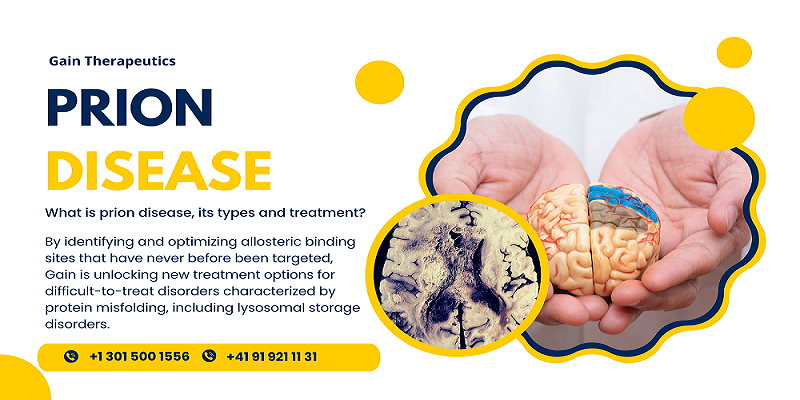What is prion disease, its types and treatment?

Prion disease, which is also known as transmissible spongiform encephalopathies or TSEs are a rare group of neurodegenerative disorders affecting both mammals and humans. In simpler words, the prion is a type of protein activating normal proteins to function abnormally in the brain. In humans, sometimes it is spread by intaking infected meat products. Due to which the most common prion disease found in humans is Creutzfeldt-Jakob disease (CJD). Other types of prion disease include:
· CJD: Since this type of prion disease is most commonly found in humans, it tends to attack people having age group around 60. A person suffering from CJD (Creutzfeldt-Jakob disease) leads to severe disability, but in most of the cases, death occurs within a year. If you are looking for a trusted place for prion disease treatment, visit Gain Therapeutics. It is the most trusted and reliable firm that unlocks new treatment options for difficult-to-treat disorders characterized by protein misfolding.
· Variant CJD: This is another type of infectious prion disease which is related to ‘mad cow disease’. Diseased meat causes normal human prion protein to function abnormally. It is mostly affecting people of young age.
· Variably protease-sensitive prionopathy (VPSPr): This disease is found in extremely rare cases affecting people around age 70 and having a family history of dementia.
Other types of prion diseases are Fatal insomnia (FI), kuru, and Gerstmann-Sträussler-Scheinker disease (GSS). FI is hereditary order causing difficulty in sleeping. Since there is a lot of awareness about the kuru disease and how it is transmitted, it is found very rarely. GSS affects people typically around age group 40. Prion disease can’t be cured or treated, but with the help of medicines prescribed by doctors its progress can be controlled. Try to keep the patient suffering from prion safe and comfortable as possible.
What are the common symptoms of prion diseases and how it can be diagnosed?
Basically, prion disease occurs when a normal prion protein, which is found on the surface of many cells, becomes abnormal and causes brain damage. It may cause memory impairment, personality changes, difficulties with movement, severe disability or even death in most of the cases. Below mentioned are the prion disease symptoms:
Ø Severe disability or difficulty in movement
Ø Muscles stiffness
Ø Fatigue
Ø Difficulty in speaking
Ø Hallucinations
Healthcare providers confirm prion disease by taking brain tissue sample either during a biopsy or after death. These tests include:
§ MRI (magnetic resonance imaging) scan of the brain,
§ fluids samples of spinal cord,
§ blood tests,
§ neurologic examination to scan any nerve damage or loss of vision,
§ ECG (Electroencephalogram) to examine brain waves.
Gain Therapeutics is a trusted and reliable firm redefining drug discovery with its SEE-Tx™ target identification platform. The team of experts spans neurodegenerative diseases, lysosomal storage disorders, prion protein misfolding diseases, metabolic diseases and oncology.

